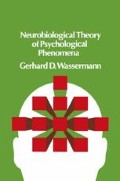Abstract
Many people have regarded certain neuropsychological hypotheses (for example, the feature detector hypothesis) as being firmly established because of their wide acceptance. This applies particularly to the assumption that nerve impulses encode and transmit ‘messages’ in nervous systems.* It is, however, difficult to see what could count as direct evidence for this or any other hypothesised form of nervous ‘message encoding’ (for example, that postulated in Chapter 1). A postulated means of message encoding can at best be shown to have considerable explanatory value within a neuropsychological theory. But even this has not been convincingly demonstrated for any of the many hypothesised spike-train codes or other nerve impulse codes (surveyed by Perkel and Bullock, 1968, and Perkel, 1970). Models based on nerve impulse message encoding will be critically examined in Chapter 6, and their difficulties suggest that a search for alternative encoding mechanisms, like that postulated in Chapter 1, may be rewarding.
Preview
Unable to display preview. Download preview PDF.
Author information
Authors and Affiliations
Copyright information
© 1978 Gerhard D. Wassermann
About this chapter
Cite this chapter
Wassermann, G.D. (1978). Doctrines of Orthodox Neuropsychological Theories and Some New Ideas. In: Neurobiological Theory of Psychological Phenomena. Palgrave, London. https://doi.org/10.1007/978-1-349-03810-7_4
Download citation
DOI: https://doi.org/10.1007/978-1-349-03810-7_4
Publisher Name: Palgrave, London
Print ISBN: 978-1-349-03812-1
Online ISBN: 978-1-349-03810-7
eBook Packages: Biomedical and Life SciencesBiomedical and Life Sciences (R0)

